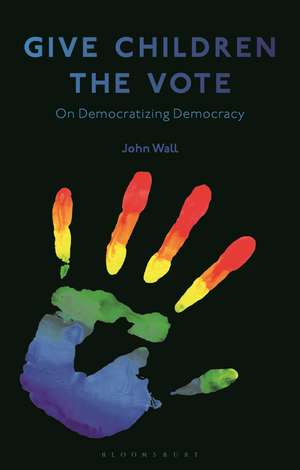Give Children the Vote: On Democratizing Democracy
Autor John Wallen Limba Engleză Paperback – 17 noi 2021
| Toate formatele și edițiile | Preț | Express |
|---|---|---|
| Paperback (1) | 128.12 lei 3-5 săpt. | +25.13 lei 5-11 zile |
| Bloomsbury Publishing – 17 noi 2021 | 128.12 lei 3-5 săpt. | +25.13 lei 5-11 zile |
| Hardback (1) | 375.91 lei 6-8 săpt. | |
| Bloomsbury Publishing – 17 noi 2021 | 375.91 lei 6-8 săpt. |
Preț: 128.12 lei
Preț vechi: 138.30 lei
-7% Nou
Puncte Express: 192
Preț estimativ în valută:
24.52€ • 26.65$ • 20.61£
24.52€ • 26.65$ • 20.61£
Carte disponibilă
Livrare economică 31 martie-14 aprilie
Livrare express 15-21 martie pentru 35.12 lei
Preluare comenzi: 021 569.72.76
Specificații
ISBN-13: 9781350196261
ISBN-10: 1350196266
Pagini: 256
Dimensiuni: 138 x 216 x 18 mm
Greutate: 0.36 kg
Editura: Bloomsbury Publishing
Colecția Bloomsbury Academic
Locul publicării:London, United Kingdom
ISBN-10: 1350196266
Pagini: 256
Dimensiuni: 138 x 216 x 18 mm
Greutate: 0.36 kg
Editura: Bloomsbury Publishing
Colecția Bloomsbury Academic
Locul publicării:London, United Kingdom
Caracteristici
Formulates a new understanding of democracy that is truly inclusive and fully democratic
Notă biografică
John Wall is Professor of Philosophy, Religion, and Childhood Studies, and Director of the Childism Institute, at Rutgers University, USA. His publications include Children's Rights (2016), Ethics in Light of Childhood (2010), and Moral Creativity (2005).
Cuprins
List of IllustrationsAcknowledgementsIntroduction1. Voting over History 2. Competence 3. Knowledge 4. Power 5. Outcomes for Children 6. Outcomes for Societies 7. The Proxy-Claim Vote ManifestoReferencesIndex
Recenzii
[T]he book is written in such a way that it makes it easy for readers to weigh up the various proposals for children's right to vote and to come to their own judgment. It is also a creative contribution to counteract the still prevalent adultism in today's societies.
Future generations will ponder why children were for so long denied the right to have their views represented at the ballot box, just as we wonder why societies argued against the right of women and people of colour to vote. Professor John Wall has written a scholarly work that is also a gripping read.
Is it time to give children the vote? In a nuanced, deeply thought and challenging way, this book combines political theory and childhood studies and demonstrates why the constraining of suffrage rights according to age can be profoundly problematic. It undercuts simplistic comprehensions about adult voting rights, competence, knowledge and how age structure power relations. John Wall extends the argument to a claim for proxy voting for all children. It contains both a vision of how proxy voting can help to redeem deteriorating democratic values and an insightful and novel social critique. This book will stimulate new thinking in a wide range of areas and deserves a broad audience among academic scholars, politicians, activists for extension of voting rights - simply anyone interested in the future of our democracies.
Future generations will ponder why children were for so long denied the right to have their views represented at the ballot box, just as we wonder why societies argued against the right of women and people of colour to vote. Professor John Wall has written a scholarly work that is also a gripping read.
Is it time to give children the vote? In a nuanced, deeply thought and challenging way, this book combines political theory and childhood studies and demonstrates why the constraining of suffrage rights according to age can be profoundly problematic. It undercuts simplistic comprehensions about adult voting rights, competence, knowledge and how age structure power relations. John Wall extends the argument to a claim for proxy voting for all children. It contains both a vision of how proxy voting can help to redeem deteriorating democratic values and an insightful and novel social critique. This book will stimulate new thinking in a wide range of areas and deserves a broad audience among academic scholars, politicians, activists for extension of voting rights - simply anyone interested in the future of our democracies.
